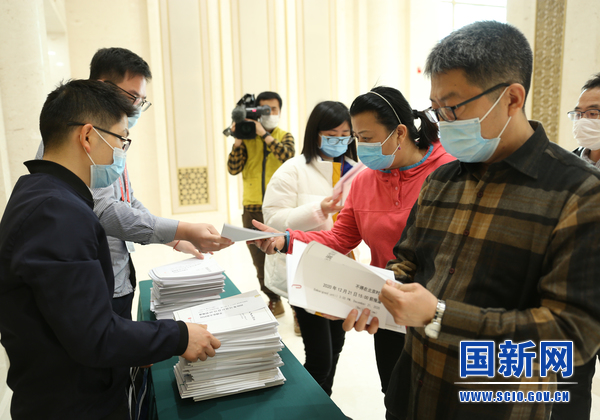
Photo: State Council Information Office
China released a white paper on the country's energy development on Monday.
Titled "Energy in China's New Era," the white paper was made public at a news briefing held by the State Council Information Office.
China gives priority to non-fossil energy development
China gives priority to non-fossil energy, and strives to substitute low-carbon for high-carbon energy and renewable for fossil energy, according to the white paper.
The country has been facilitating the use of solar energy, developing wind power, hydropower as well as safe and structured nuclear power while advancing biomass, geothermal and ocean energy development in accordance with local conditions.
The country has been increasing the overall utilization rate of renewable energy, with the national average consumption rate of wind power reaching 96 percent, that of solar photovoltaic power hitting 98 percent, and that of water energy in major river basins reaching 96 percent in 2019, the document said.
"The development and utilization of non-fossil energy is a major element of transitioning to a low-carbon and eco-friendly energy system," it said.
While prioritizing non-fossil energy, the country has also been promoting the clean and efficient development and utilization of fossil energy.
Coal remains the basic energy source, the white paper said, adding that the country's annual production of raw coal has ranged between 3.41 billion tonnes and 3.97 billion tonnes since 2012.
The country has been facilitating the safe, smart and green utilization of coal. From 2016 to 2019, China cut more than 900 million tonnes of outdated coal production capacity per year on average.
"Green development of the energy sector has played an important role in reducing carbon emissions," the white paper said.
By 2019, carbon emission intensity in China had decreased by 48.1 percent compared with 2005, which exceeded the target of reducing carbon emission intensity by 40 to 45 percent between 2005 and 2020, reversing the trend of rapid carbon dioxide emission growth, it said.
China adopts new energy security strategy
China has adopted a new energy security strategy, vowing to promote reforms in energy supply and consumption, market building and innovation while strengthening international cooperation.
The strategy, featuring reform mainly in four aspects and comprehensive international cooperation, endeavors to adapt to domestic and international changes and meet new requirements, said the white paper.
REFORM TO IMPROVE ENERGY CONSUMPTION STRUCTURE
One of the reforms under way is to improve the country's energy consumption structure by containing unnecessary consumption. To that end, China has tightened the control of total energy consumption and energy use intensity, enforced energy conservation in all areas of social and economic development, and taken moves to adjust its industrial structure, promote energy conservation in the process of urbanization and develop a green and low-carbon transport system.
REFORM TO DIVERSIFY ENERGY SUPPLY
To optimize and diversify its energy supply structure, China has been vigorously promoting the clean and efficient utilization of fossil energy, prioritizing the development of renewable energy, developing nuclear power in a safe and orderly manner, and raising the proportion of non-fossil energy in the energy supply structure. Exploration and exploitation for oil and gas resources have also been enhanced.
REFORM TO UPGRADE ENERGY TECHNOLOGIES
China is implementing an innovation-driven development strategy, building a system that nurtures innovation in green energy technologies, and upgrading energy technologies and equipment in an all-round way. Basic research on energy, innovation in generic and disruptive technologies, and original and integrated innovation have been strengthened. China has also started to integrate digital, big-data and AI technologies with technologies for clean and efficient energy exploration and exploitation, with a focus on smart energy technologies, to foster new growth drivers for industrial upgrading.
REFORM TO PROMOTE FASTER GROWTH OF ENERGY SECTOR
China has been making efforts to form a unified and open market with orderly competition, advance energy pricing reform to create a mechanism in which the market determines the price. It also strives to streamline government administration through reform, strengthen planning and policy guidance for the energy sector, and improve the regulatory system of the energy industry.
GLOBAL COOPERATION FOR ENERGY SECURITY IN OPEN ENVIRONMENT
China has been advancing comprehensive cooperation with other countries to realize energy security in an open environment. Under the principle of equality and mutual benefit, China is opening its door wider to the world. The country promotes green and sustainable energy development under the Belt and Road Initiative, and endeavors to improve energy infrastructure connectivity. An active participant in global energy governance, China has been increasing energy cooperation and exchanges with other countries, and facilitating international trade and investment in the energy sector. The country has also joined the international community in building a new model of energy cooperation, maintaining energy market stability, and safeguarding common energy security.
GUIDING PHILOSOPHIES FOR POLICY MAKING
The white paper also stated the guiding philosophies for China's energy policies in the new era, namely, putting people first, promoting the use of clean and low-carbon energy, ensuring the core status of innovation, pursuing development through reform and building a global community of shared future.
"Confronted by the severe impact of climate change, China advocates a global community of shared future, greater international cooperation on energy governance, and a new round of energy reform directed towards clean and low-carbon development," said the document.


